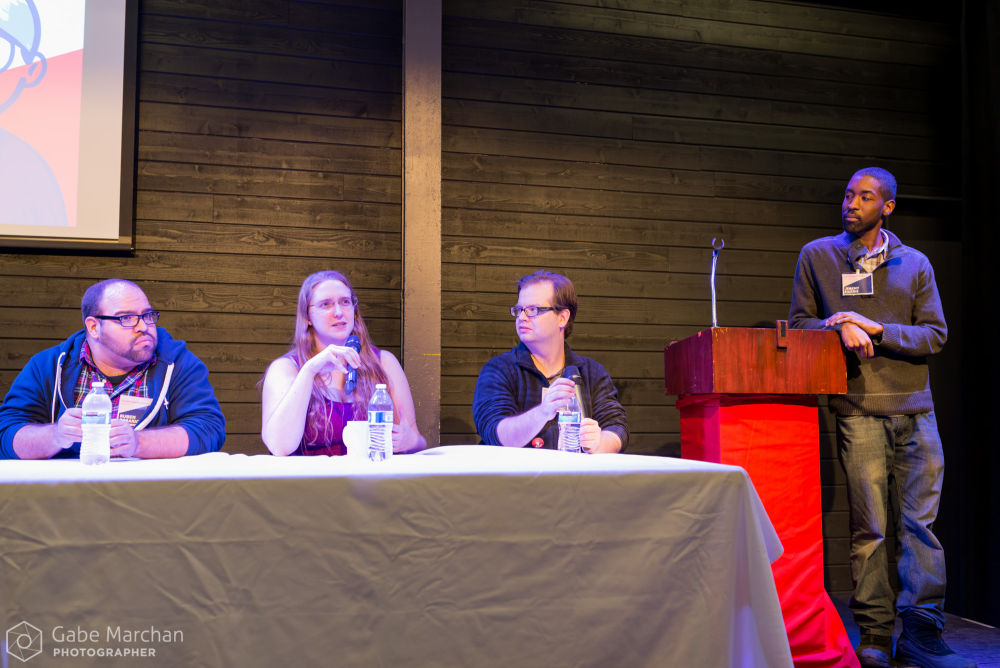On November 21st, 2015, AnimeChicago hosted its first ever symposium at the Cards Against Humanity Theater, focusing on the “God of Manga” Osamu Tezuka. Despite the uncooperative weather, a dedicated group of attendees enjoyed a day filled with education and entertainment, which was the culmination of a great deal of effort and passion by the AnimeChicago team, along with guest speakers Natsu Onoda Power and Ada Palmer and the event’s sponsors. Attendees were greeted at the door with fan art by local Chicago artists and an extensive Tezuka museum provided completely by Ada showcasing a wide range of toys, books and other hard-to-find memorabilia that spanned Tezuka’s career, including such oddities as Black Jack toilet paper and bootleg Astro Boy comics from around the world.
AnimeChicago team member Neil Clingerman screened a brief introductory documentary about Tezuka’s creative process for attendees that showcased Tezuka’s small studio and his unique methods for bringing his works to life. Afterwards, guests Natsu and Ada gave a quick overview of Tezuka, his history and his lasting impact on the manga world.

Natsu then presented her talk on the role of theatrics within Tezuka’s complete works. She discussed Tezuka’s involvement with theater as a young man and how that played a major role in the way he shaped his stories. Furthermore, she elaborated on his love of film and how he would also incorporate themes and even scenes from his favorite movies into his works. It was from these influences, that Tezuka created his impressive “Star System” in which he utilized his characters in multiple works as though they were actors and actresses for an imaginary studio. He went so far as to assign them “salaries” and kept detailed notes on their appearances in different series. Natsu explained that this served to create a sense of theatricality amongst his works that dedicated fans would recognize and understand. The characters he created, though slightly different in each series depending on the role they were given, would allow readers to understand that they were the audience viewing a performance.

Up next, AnimeChicago team member Ruben Rosario gave a presentation on Tezuka’s influence amongst modern comics artists working in the West. He compared the cinematic flow of Tezuka’s panels, with its strong sense of motion, to many of the popular comics artists working today and discussed how different Tezuka was to his American comics peers. Ruben focused not only on the movement that Tezuka’s panels had, but also the arrangement of the pages and even the panels themselves. Ruben commented on the difference between the static 9-panel style that was popular in American comics at the time and the free-flowing and unrestricted nature of Tezuka’s manga. Ruben pointed out that without Tezuka’s influence on manga creation in Japan, that same free-flowing style might not have made its transition over to American comics.
Intermixed with the guest speakers and presentations, attendees watched various shorts and clips from Tezuka’s career that highlighted different key elements of Tezuka’s animated works. The clips and shorts gave glimpses into Tezuka’s inspiration from Disney films, other American animation, and even early experimental animated film.

Ada was the final speaker of the evening, giving a talk on Tezuka’s use of intertextuality. She focused again on Tezuka’s “Star System,” this time on its effect on individual character’s karma throughout Tezuka’s wide array of works. Ada discussed how the choices and actions of a character in one series would affect the fate of another character in a different series, with the connection being that both characters were “played” by the same actress or actor from the “Star System.” Ada pointed out that to a first time reader of Tezuka’s works, most of this would never be obvious and that it takes familiarity with many or all of his works to understand these connections, which many Japanese fans had the privilege of doing, since they grew up with Tezuka. The karma in Tezuka’s works does not always flow linearly either, future choices and actions can have an impact on earlier character fates. Future, in this sense, can mean both later published works and works that take place in a chronological future. This goes to show the level of depth and detail Tezuka placed in his series.
The symposium wrapped up with a Q&A session with the guest speakers, followed by a raffle for all attendees, including gift certificates from Arda Wigs and titles from Digital Manga Publishing. Afterwards, attendees were invited to stay for a mixer held at the theater, where attendees enjoyed snacks sold by Nakama Toys and free beer provided by members of the Logan Brewlevard Society. AnimeChicago thanks all sponsors, guests and attendees for their participation in the first of what hopes to be many great events!


